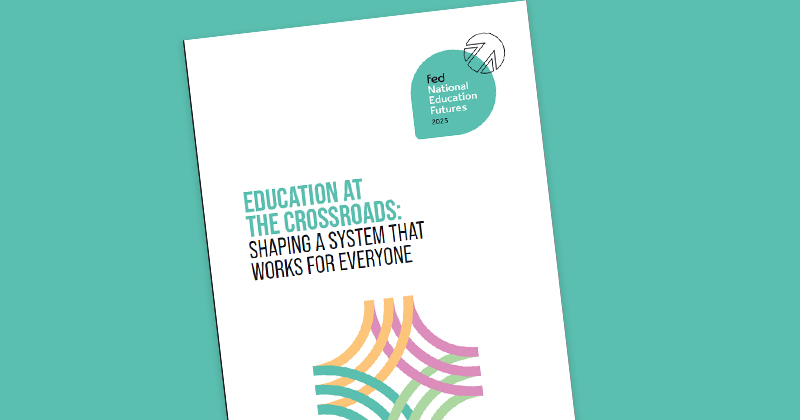After decades of piecemeal reform, short-term fixes and mounting pressures to do ever more with ever less, schools are in desperate need of a bold vision. The Foundation for Education Development’s (FED) new report, Shaping a System That Works for Everyone provides it.
From disjointed efforts to fight emerging and ongoing crises, it takes us to a system-wide transformation rooted in inclusion and workforce renewal. And from beggar-thy-neighbour competition, it guides us towards genuine partnership.
The evidence in favour of fundamental change is stark. Over 300,000 children are missing from education, a 41-per cent increase in six years. Exclusion rates for Black Caribbean girls have tripled. More than 4.3 million children live in poverty, and over 40 per cent of local authorities face financial crisis due to SEND-related deficits.
Meanwhile, 70 per cent of education professionals say support for learners with SEND is worsening, and 64 per cent believe long-term planning for education has deteriorated.
As the report shows, this is not a failure of effort. It is a legacy of structural inertia and under-investment.
In spite of that, schools, trusts and local partnerships across the country are proving what is possible, but their successes remain isolated – pockets of promise in a system held back by short-termism and fragmented infrastructure.
Three priorities
This report is not just another set of recommendations. It is the product of the most wide-ranging national consultation of its kind, drawing on the voices of educators, leaders, young people, parents, businesses and communities.
It identifies three urgent, interconnected priorities:
Inclusion
To build a system that works for all learners, inclusion must move from being a reactive accommodation to a proactive foundation, ensuring no learner is left navigating a system that wasn’t built for them.
The report calls for a national inclusion framework and an inclusive education guarantee to set consistent, enforceable expectations for inclusive practice across all schools and settings.
Workforce
Focusing on training and retainng is not a sustainable way to secure the talent every classroom deserves. Instead, we need a systemic culture built on trust, wellbeing and growth.
To that end, the report proposes a national strategy to make education careers more inclusive and appealing, to prioritise professional development and to increase flexibility.
Partnerships
But none of this (and none of our educational priorities) can be delivered equitably in a system that promotes isolated institutional performance.
To move us towards genuine system-wide collaboration, the report urges a shift from competition to shared accountability, investing in the infrastructure and people that will ultimately deliver the deep, place-based partnerships we need.
A post-compliance age
The simple fact is that the system we have was not designed to meet the scale or complexity of today’s challenges. If we fail to act now, inclusion will remain patchy, attainment gaps will widen and workforce pressures will only grow (in spite of falling rolls).
What this report recognises, and it’s a breath of fresh air, is that the answers in the main are not to be found in Whitehall meeting rooms. They already exist in our schools and communities.
What the DfE needs to do is to connect what works to the places that need it, learn from successes and failures, and scale best practice system-wide. The age of box-ticking compliance is over. It’s time for a new model of improvement that recognises our professionalism.
This report is a brilliant example of that. It proposes practical, evidence-informed reforms grouped into three timeframes for implementation: short-term (one to two years), medium-term (three to five years) and longer-term (up to 10 years).
Crucially, it calls for a culture of courage: where people know how and when to use their agency to challenge unhelpful compliance, and where long-term planning is not optional, but the foundation of excellence and equity.
As the FED prepares to launch the National Education Assembly, a fully stakeholder-led platform to give all parts of the education system a meaningful voice in shaping policy, this report marks a turning point.
Now, it’s on us to act.
Read the full report here












After the fiasco of the last 20 years where bathwater and baby come to mind, only radical measures, rethinking education, individual learning and teaching methods through assessment for learning, not selection by standardised tests, must be the way forward.
Graduates straight from university with little employment and other life learning experiences are inadequately trained or prepared for the classroom of 30 or more learners.
Taking a leaf from Finland’s education system, where fee paying schools are non existent and testing for university and apprenticeships is much later, money saved from SATS and GCSE’s, integration of local fee paying and state schools, would enable half class sizes, more digital learning as appropriate, and mentors from industry to supervise, monitor and organise.
The ongoing concern of learners unable to reach acquired levels of more complex vocabulary to ensure succesd in Level 2 Maths/number and English Language skills (Literature not really essential until later) can be dealt with by including the successful Lexonik.co.uk whole school programme that develops literacy strategies started in Primary but not continued in Secondary because not part of training…
The 900,000 NEETS have been caused by tge lack if alternative and restricted access to different types of learning, assessment and qualifications at 14+. A Levels without As has failed so many who make wrong choices and end up with nothing or low grade A Levels.
Apprenticeships need earlier preparation for, with Functional Skills started in Year 9, for all to develop financial awareness, widening, advertising locally and across large towns and cities with amended terms and conditions for those who have to change jobs or companies drop out.